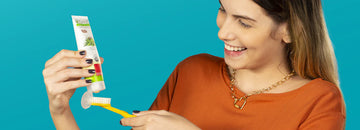In this age of digital information and disinformation, it’s sometimes difficult to sort out what’s factual and what’s…..not so factual.
At RADIUS, we’re here to help.
In this article, we thought we’d give you the run-down on 9 of the most common 2020 rumors about your oral care.
It’s time for another round of FACT OR FICTION!
Your toothbrush can cause you cancer.

This is true for some (not all...thank gawd) toothbrushes that contain the additive BPA. BPA is a common additive to plastics, including cheaply made toothbrushes. It is particularly dangerous when the plastic is heated or scratched. BPA is not only extremely toxic to wildlife, but it has been linked to a myriad of diseases including Alzheimers, asthma, type 2 diabetes, cardiovascular disease and, yes, even hormone-related cancers.
All this said, you do have to have elevated levels of BPA to incur these serious symptoms. So, in all likelihood, you and your loved ones are safe but should proceed with caution in your future oral care choices.
The solution? Buy the right toothbrush. At RADIUS, we take care to only use premium, non-toxic materials without any nasty additives (this goes for all our products, not just the toothbrushes). Not sure which one to try? Start with our multi award-winning Big Brush.
Sugar causes cavities

We know! All you’ve been told about not eating too many Christmas cookies because you’ll get cavities are LIES! Well...sort of. Sugar doesn’t cause cavities directly, but it does attract the bacteria that produces an acid that causes tooth decay. So...it indirectly causes cavities.
A way to combat these sugar-related fiends? Rinse with water after eating those holiday goodies. Then, after 20 minutes or so, give your teeth a good brush. (You don’t want to brush directly after because eating causes acid to temporarily build up in your mouth which can be abrasive on your enamel when combined with a brush).
Your toothpaste is bad for you.

It really depends on the type of toothpaste you are using. But first, we’ll clarify that, yes, you should be using toothpaste. As we explored in this article, while toothbrushes can remove plaque and bacteria all on their own, that doesn’t mean they’re as effective without toothpaste. Certain elements such as the bacteria-busting components, lubrication and mild abrasives in toothpastes can do wonders in cleaning those chompers.
All that said, which toothpaste you use matters. Many toothpastes contain fluoride, which has come under severe scrutiny for its relationship with enamel defects, along with other conditions such as skeletal fluorosis, thyroid issues, decreased fertility and stunted neurological development. We recommend reading this brief overview of the dangers of excess fluoride (particularly if you are pregnant or a parent).
Think all-natural toothpaste is better? Maybe, maybe not. As we explore in this article, there is a difference between natural and organic. Natural may be free of synthetics or preservatives, but that doesn’t prevent the original ingredients from being grown with pesticides, herbicides, fertilizers or even hormones.
Drawn in by that snazzy charcoal toothpaste? Forgettaboutit. It is the worst of the worst. Not only are it’s claims of whitening tenuous at best, its abrasiveness can lead to enamel damage and it has carcinogenic polyaromatic hydrocarbons that put you at an elevated risk for cancer.
So what’s a safe alternative?
Try our newly patented RADIUS USDA organic toothpaste with coconut oil, rice powder, and cavity-fighting erythritol that cleans and whitens safely. Plus, it’s totally free of any chemicals, detergents, artificial preservatives, parabens, synthetics or harmful ingredients of any kind. One more thing? It comes in flavors like Clove Cardamom that literally tastes like Christmas.
When you brush harder, you clean better.

No, brushing harder does not make your teeth more clean. In fact, too much pressure can actually damage your enamel and, conversely, cause more susceptibility to decay. This is why most dentists, and we at RADIUS, recommend soft bristle toothbrushes.
However, we understand that lifetime habits are hard to break. If you are naturally a harder brusher, we at RADIUS created a toothbrush just for you. Our Flex Brush toothbrush has a flexible, angled neck designed to alleviate pressure on your teeth and gums for those of us that are a bit more...vigorous...in our brushing routines.
Toothbrushes produce 50 million pounds of plastic waste in U.S. landfills every year.

Unfortunately, this is all too true. 1 billion toothbrushes are thrown out every year in the U.S. resulting in 50 million pounds of landfill waste.
The solution? While it is nearly impossible to have zero ecological footprint when it comes to your toothbrush, it is quite possible to reduce your waste. Try RADIUS Big Brush, Source Brush and Tour Brush toothbrushes. These brushes feature replaceable heads, PLA-free and BPA-free handles made from bioplastics, and bristles made from vegetable-nylon. All in all, these adjustments reduce plastic waste by 90%+. Plus, our plastics are made with EcoPure® additives, ensuring that all our products are biodegradable in landfills. Read more about our mission to reduce our ecofootprint here.
You don’t really need to take that good care of your kid’s teeth. They lose their baby teeth anyway.

Although kids lose their baby teeth, that doesn’t mean that you should ignore good oral health for your kids! Why? All these reasons:
- Cavities can be painful and, if left untreated, can lead to serious infection and even abscesses! There is no good reason for your kiddo to be going through unnecessary discomfort;
- Brushing your teeth isn’t just about the teeth, it’s about the gums too! We know through several peer-reviewed studies that gum disease is correlated with overall health and has been linked from conditions such as respiratory disease and diabetes;
- When a deciduous tooth is lost prematurely due to cavities, it creates a space….a space that other nearby adult teeth naturally try to fill. Then, when the adult tooth underneath the original baby tooth is finally ready to erupt, there is not enough space. This can lead to tooth crowding;
- Teaching your kids the importance of taking good care of their teeth sets them up for a lifetime of good dental habits;
- You want your kiddo to make friends. Bad breath = maybe a bit more distance on the playground.
The type of filling you get doesn’t matter.

Gold? Silver? Ceramic? Does it really matter or is it simply a matter of aesthetics?
There is a lot of variation in fillings and we encourage you to do some serious research on what is right for you. Here is a helpful breakdown. We won’t get into all details but two serious considerations you should be aware of:
- Gold fillings placed next to silver fillings can actually cause an electric shock (known as galvanic shock) to occur. So, if you’re going metal, go one or the other,
- Silver fillings contain small amounts of mercury which, while probably not enough to cause real toxicity in most people, can cause a prominent allergic reaction in about 1% of people. So, if you’re going metal, go gold.
Having dental insurance isn’t worth it.

Right now, many of us are smack-dab in the middle of figuring out our health coverage for the coming year.
Whether or not dental insurance is really worth it depends on the average cost of dental exams where you live, your age, your previous dental history, your family history, your diet, your activities, etc.
Generally, we recommend that you can find a dental insurance near you that covers preventative care and gives you a little peace of mind if any dental emergencies arise.
However, here is a complete run-down of pricing and pros and cons to help you figure it out.
One more thing: if you have kids, this is a no brainer. Get insurance. You know how kids are. You don’t not want to be covered.
Your dog doesn’t need dental care.

Yep. Your dog’s teeth? They are susceptible to the same bacteria and infections as human teeth. If you don’t take care of your canine’s canines you are, at best, in for a hefty vet bill down the line and, at worst, facing some serious health complications. Studies indicate that, like humans, gum disease in dogs is linked with canine heart disease.
Want to make sure your pooch stays healthy? Try RADIUS Canine Organic Oral Care kit!

Now go forth and smile easy, friends!


